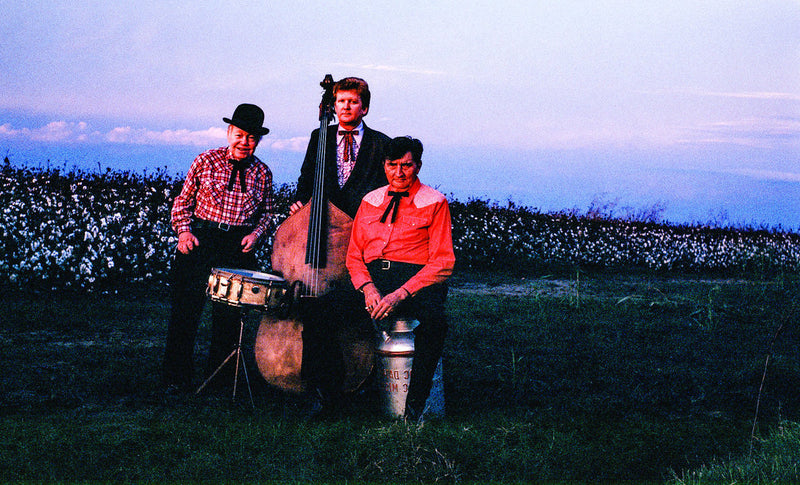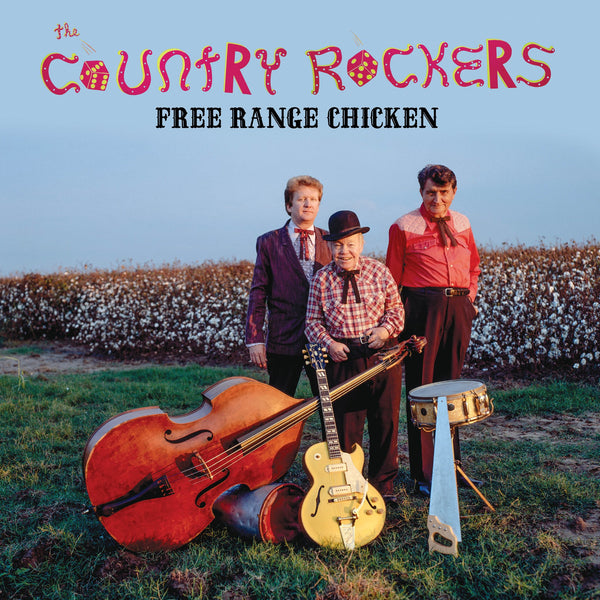The Country Rockers

Thirty years ago, long before the arrival of warehouse complexes
owned by Williams-Sonoma, Nike, and Amazon, driving down Lamar
Avenue in southeast Memphis was like climbing into a time machine
set for the mid-1950s. Starting in Midtown, you’d drive by the
sprawling John Grisanti’s, an Italian restaurant at the corner of Lamar
and Airways. Next, you’d pass the Americana Club, which, nearly
everyone knew, was once the site of Clearpool, a swimming pool and
ballroom complex topped by the country-and- western dance club the
Eagle’s Nest. On your right, the “Big Shoe,” a poured concrete shoe
store, straight out of a fairytale, and next door, the Dog House,
famous for its foot-long chili dog. Linking them all together were
dozens of mom-and- pop restaurants plying soul food, catfish plates,
and barbecue sandwiches via hand-painted signs or faded neon.
The weird old-timey sprawl continued as you crossed the state line
into Mississippi. Juke joints and roadhouses dotted Lamar before it
turned into the divided highway US 78. There was the Smoke House,
where a character named Messy Bessy would don a horned helmet
and ride a tricycle around the dance floor. There were other forgotten
cinder-block or wood-framed rooms, with a bar at one end and a
simple set-up for a band at the other, opened for happy hour and
closed a few hours before sunrise.
country roadhouses, a bar called Dennis’ Place. There, he saw Sam
Baird, a school bus driver who spent his evenings playing guitar, on
stage with a country band. Baird also gigged with drummer Gaius
Farnham (day job: warehouse employee for an ice cream company)
and a bassist named Miss Lillian at a Memphis bar called the
Sunflower Club, located at 2020 Lamar. Easley was a frequent
customer there, where he and Alex Chilton would study the trio as
they plowed through old Hank Williams-era tunes.
Easley walked into Dennis’ Place looking to unwind; he left with a
new band.
“Miss Lillian got religion and quit playing the devil’s music, opening
the way for me to slide in,” Easley says today. “Dennis’ Place is
where it all gelled. I could have just as easily driven right by that
night, and gone on home.”
Easley, an accomplished guitarist and bassist who counts B.B.
Cunningham and Roland Janes among his mentors, was busy with
his own career. He’d shared the stage with both Duke Ellington and
Tav Falco’s Panther Burns. During a four-year stint in Dallas, Texas,
he recorded jingles, ads, and soundtracks. Back in Memphis, he’d
spend the next decade-plus touring as Chilton’s bassist. In between
dates, the Country Rockers were born.
“It was easy,” Easley tells me. “They were playing great music from
the birth of rock-and- roll and early country music, from before it
became a hat-wearing contest. Yet at the same time, what business
did I have making music with them?”
While, under the name Durand, he devised a Beatles-esque logo for
the Country Rockers, took them into the recording studio, onto stages
at punk clubs, and to New York and Europe, Easley was hardly a
meddler. Rather, he recognized the beauty of the group: Baird’s stoic
presence at the microphone, looking like the mournful Kaw-Liga he
frequently sang about; the novelty offered by the presence of
Farnham, a dwarf, on the drums; the sincere delivery of songs like
“Pistol Packin’ Mama” and “My Happiness,” which date back to the
1940s.
When the Country Rockers played in clubs frequented by younger
audiences than those who visited the Sunflower Club, they were an
immediate success.
“We never should’ve played the Antenna Club,” Easley says with
emphasis. But the Country Rockers became an integral part of the
mid-1990s scene at the Midtown Memphis punk venue, sharing the
bill with acts like Chilton and the all-instrumental band Impala.
Sometimes, the Country Rockers played across the street from the
Antenna at a small brick bar called Murphy’s; at least once, in the late
‘80s, they performed at the WPA-era bandshell located in Overton
Park.
The Country Rockers’ debut album, Free Range Chicken, was
released on the French label New Rose Records in 1988. Easley
produced the thirteen-song album, recorded at his younger brother
Doug’s four-track Easley Recording Studio. A follow-up called
Cypress Room was released three years later.
By then, Farnham was the recipient of a nickname: Ringo.
And like his namesake Ringo Starr, Farnham was allowed to sing one
song on each record. His opening holler and solo on “Wipe Out,”
included on Free Range Chicken and played on his vintage
Slingerland trap kit, helped launch the Country Rockers into an alt-
stardom of sorts.
On his blog, New Duncan Imperials guitarist Pigtail Dick recounts
discovering the Country Rockers after an Antenna soundcheck in the
early ‘90s: “We crossed the street in the rain and entered a scene
both familiar and strange,” he writes. “The beat-up bar was lit glowing
red from beer signs, cloudy with smoke from unfiltered Camels, and
populated by a few dozen serious drinkers who all turned their heads
to behold these three straw hats walking into their inebriated little
world. But most of all, there was a band onstage whom we instantly
fell in love with. It was the Country Rockers, and to us they looked
something like where we might be in 50 years—a three-piece band of
croakers slinging the prehistoric classics with casual authority. The
primitive beats chased away our blues as we sat in the glowing red
haze and sucked down icy PBRs.”
On June 20, 1992, the Country Rockers made their New York debut,
performing at CBGB as part of the New Music Seminar, which, that
year, also featured the Clean’s David Kilgour, alt-hip hop group
Basehead, the Lunachicks, fellow Memphians the Grifters, and
Shudder To Think.
In a preview of their CBGB performance, Baird told the New York
Times about meeting Elvis Presley. “I went out to Graceland and
talked to him. He had advertised for a bass player and a lead
guitarist. I played upright bass then. Me and this boy went over and
talked to him about playing. But he’d already got somebody. He was
nice, alright.” Farnham told the reporter that he had visited New York
once before—for the World’s Fair. “In 1939,” Easley added, in a
practiced deadpan.
“CBGB was packed like sardines,” Easley remembers. “As we were
making our way to the stage, I came face-to- face with Spalding Gray.
I looked him in the eye and kept going. We had 30 minutes, but when
we started playing, we had a squealing mic. I said, ‘Stop! Mr.
Soundman, our time doesn’t start until that squealing stops.’ He got it
fixed, and we went on with the show.”
The Country Rockers toured Europe. They shared the bill with
Shonen Knife at Maxwell’s in Hoboken and on the road in Germany.
They made a brilliant music video for the song “Drivin’ Nails in My
Coffin” with filmmaker Dan Rose, who shot color 16mm and black
and white 8mm footage on the road and on location at Memphis’
Lamplighter Lounge and at Horseshoe Lake in Arkansas.
Memphis author Robert Gordon touted the Country Rockers in the
pages of Spin Magazine and in his fantastic history of Memphis
music, It Came from Memphis. Their albums were reissued
domestically by Telstar Records. Farnham returned to New York
twice to appear on Jon Stewart’s late night MTV talk show as a solo
act.
There’s a YouTube video dating back to July 1993, when a packed
house celebrated Farnham’s eightieth birthday at Barristers, a
downtown Memphis venue that became the go-to alternative music
spot as the Antenna Club’s lengthy run began to wind down.
Videographer Bob Angst captured nearly two hours of footage that
night. Farnham blows out all 80 candles on his gigantic birthday cake,
which is topped with a plastic stagecoach pulled by a team of horses.
He’s placed in a chair onstage, where a girl performs a slow
striptease, working her way down to a pink bikini. Easley, wearing a
ruffled tuxedo shirt and cowboy suit, serves as master of ceremonies;
late in the evening, when the Country Rockers take the stage,
Farnham has donned mirrored sunglasses and a fancy bolo tie. The
audience bobs and bounces enthusiastically. Baird, his Harmony
guitar strapped across one shoulder, takes it all in stride.
“On our last tour of Germany, I asked for a wheelchair for Gaius so
he could keep up with us,” Easley says. “We were onstage in
Nuremberg and in the middle of a song when the drumming stopped.
I turned around, and Gaius wasn’t there. He’d fallen off the back of
the riser. They picked him up, put him back in place, and Gaius
played like a madman!”
In 1994, the Country Rockers were forced into retirement when
Farnham’s sister Betty died, and he had to relocate to live with
another sister, Marguerite, in College Park, Maryland. The Country
Rockers feted their drummer with a going away party at the Antenna,
then reunited for one more gig, playing the Lollipop Festival in
Stockholm, Sweden in 1996. They shared the bill with Bob Dylan,
Beck, and the Wu-Tang Clan.
Farnham died on New Year’s Day 2000, at the age of 86. “Gaius
went just after the clock struck Y2K, at two in the morning,” Easley
recalls. “He took baby steps into the year 2K and said, ‘I’m outta
here.’”
Baird followed Farnham across the Great Divide six years and 26
days later. It was an ignominious end for the Country Rockers’
frontman, who had started out playing rhythm guitar in 1939. “Sam
had been put in a home in Collierville,” says Easley. “When he died,
his guitars were taken into Yarbrough’s Music and sold for a dime on
a dollar. He had a Martin, a dobro, an upright bass… I got his electric
Harmony for $65.”
Reflecting back, Easley has few regrets, other than small stuff like not
adding a version of the Louvin Brothers’ “You’re Running Wild” to the
Country Rockers’ set list. “I realized pretty quickly that I couldn’t teach
Sam any new songs—this is it,” he says. “I do wish we could’ve done
more, but I don’t think we could’ve done any more than we did.”

